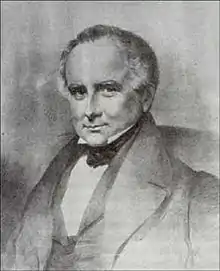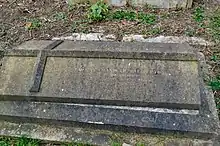Thomas Chandler Haliburton
Thomas Chandler Haliburton (17 December 1796 – 27 August 1865) was a Nova Scotian politician, judge, and author. He made an important political contribution to the state of Nova Scotia before its entry into Confederation of Canada. He was the first international best-selling author of fiction from what is now Canada. In 1856, he immigrated to England, where he served as a Conservative Member of Parliament. He was the father of the British civil servant Lord Haliburton and of the anthropologist Robert Grant Haliburton.
Thomas Chandler Haliburton | |
|---|---|
 | |
| Member of Parliament for Launceston | |
| In office 1859–1865 | |
| Preceded by | Josceline Percy |
| Succeeded by | Alexander Henry Campbell |
| Personal details | |
| Born | 17 December 1796 Windsor, Nova Scotia |
| Died | 27 August 1865 (aged 68) Isleworth, England |
| Political party | Conservative Party (UK) |
| Spouses | Louisa Neville
(m. 1816; died 1840)Sarah Harriet Owen Williams
(m. 1856) |
| Children | |
| Parent |
|
| Relatives |
|
| Signature | |
Life
On 17 December 1796, Thomas Chandler Haliburton was born in Windsor, Nova Scotia, to William Hersey Otis Haliburton, a lawyer, judge and political figure, and Lucy Chandler Grant.[1] His mother died when he was a small child. When Thomas was seven, his father married Susanna Davis, the daughter of Michael Francklin, who had been Nova Scotia's Lieutenant Governor.[2] He attended University of King's College in Windsor, from which he graduated in 1815. Later he became a lawyer and opened a practice in Annapolis Royal, the former capital of the colony.
Haliburton attained distinction as a local businessman and as a judge, but his greatest fame came from his published writings. He wrote a number of books on history, politics, and farm improvement. He first rose to international fame with his Clockmaker serial, which first appeared in the Novascotian and was later published as a book throughout the British Empire, as popular light reading. The work recounted the humorous adventures of the main character, Sam Slick.
In 1816, Haliburton married Louisa Neville, daughter of Captain Laurence Neville, of the Eighth Light Dragoons.
Between 1826 and 1829, Haliburton represented Annapolis County in the Nova Scotia House of Assembly.
Relations with English Burton family
Thomas Chandler Haliburton resided in England from 1837,[3] where he was hosted and entertained in London by his cousins Decimus Burton, Jane Burton, James Burton, the Egyptologist, Septimus Burton, the solicitor, Octavia Burton, and Jessy Burton.[4] Thomas asked James Burton, the Egyptologist, to check the proofs of his work Letter Bag of the Great Western, with which Burton was unimpressed, in 1839, and those of the third series of The Clockmaker in 1840.[5] The pair travelled together to Scotland to investigate their common ancestry, and intended to tour Canada and the United States of America together.[5] Thomas Chandler Haliburton's daughter, Susannah, was impressed by James Burton, the Egyptologist: she wrote, in 1839, "Mr James I admire very much. He is one of the most well-bred persons I saw &... decidedly the flower of the flock".[4]
Retirement and subsequent life

In 1856, Thomas Chandler Haliburton retired from law and moved to England.[1] In the same year, he married Sarah Harriet Owen Williams. In 1859, Haliburton was elected the Member of Parliament for Launceston, Cornwall as a member of the Conservative minority. He did not stand for re-election in 1865.
Haliburton received an honorary degree from Oxford for his services to literature. He continued writing until his death on August 27, 1865 at his home in Isleworth, near London[6] and is buried in All Saints' churchyard.
Family


While in England, Thomas Chandler Haliburton met Louisa Neville, daughter of Captain Laurence Neville, of the Eighth Light Dragoons. In 1816, he married her, soon thereafter returning to Nova Scotia with her. Louisa's story before marriage is related in the "Haliburton Chaplet," edited by their son, Robert Grant Haliburton (Toronto: 1899). The couple had three sons and five daughters:
- Susannah Lucy Anne, later Weldon, 1817–1899, ceramic collector[2]
- Thomas Jr. was an accomplished musician, having studied in Germany. He became increasingly ill with an “original defect of mind” resulting in him being admitted to an insane asylum in Massachusetts, where he died at the age of 26. [7]
- Augusta - Mrs. A. F. Haliburton married an Iron Master.
- Emma - Mrs. Bainbridge Smith (Anglican Clergymen)
- Amelia (25 Jul 1829 – 14 Jan 1902), landscape artist, married the Rev. Edwin Gilpin, Dean of Nova Scotia, in 1849; the couple had four sons and one daughter,[8] including Edwin Gilpin (1850–1907), a mining engineer and author[2]
- Robert Grant Haliburton, Q.C., D.C.L., 1831–1901, lawyer, author, and anthropologist[2]
- Laura Charlotte, artist, married William Cunard, son of the shipping magnate Sir Samuel Cunard at Windsor, Nova Scotia, 30 December 1851; three sons, one daughter. Exhibited her pictures at the Royal Academy, the Gallery of British Artists, and at other institutions in London.[9]
- Arthur (1832–1907), later 1st Baron Haliburton, G.C.B., British civil servant and the first native Canadian to be raised to the Peerage of the United Kingdom.
Legacy
Haliburton was eager to promote immigration to the colonies of British North America. One of his first written works was an emigrant's guide to Nova Scotia published in 1823, A General Description of Nova Scotia; Illustrated by a New and Correct Map[10] The community of Haliburton, Nova Scotia was named after him.[11] In Ontario, Haliburton County is named after Haliburton in recognition of his work as the first chair of the Canadian Land and Emigration Company.
In 1884, faculty and students at his alma mater founded a literary society in honour of the College's most celebrated man of letters. The Haliburton Society, still active at the University of King's College, Halifax, is the longest-standing collegial literary society throughout the Commonwealth of Nations and North America.
The mention "hurly on the long pond on the ice", which appears in the second volume of The Attaché, or Sam Slick in England, a work of fiction published in 1844, has been interpreted by some as a reference to an ice-hockey-like game he may have played during his years at King's College. It is the basis of Windsor's disputed claim to being the town that fathered hockey.[12]
In 1902, a memorial to Haliburton and his first wife was erected in Christ Church, Windsor, Nova Scotia, by four of their children: Laura Cunard, Lord Haliburton, and two surviving sisters.
Nova Scotian artist William Valentine painted Haliburton's portrait. His former home in Windsor is preserved as a museum.[13]
Works
- A General Description of Nova Scotia - 1823
- An Historical and Statistical Account of Nova Scotia - 1829
- The Clockmaker - 1836
- The Clockmaker, 2nd Series - 1838
- The Bubbles of Canada - 1839
- A Reply to the Report of the Earl of Durham - 1839
- The Letter-Bag of the Great Western - 1840
- The Clockmaker, 3rd Series - 1840
- The Attaché; or Sam Slick in England - 1843
- The Attaché; or Sam Slick in England, 2nd Series - 1844
- The Old Judge, Or Life in a Colony - 1849
- The English in America - 1851
- Rule and Misrule in English America - 1851 vol 1 vol 2
- Sam Slick's Wise Saws and Modern Instances - 1853
- The Americans at Home; or, Byways, Backwoods, and Prairies - 1855
- Nature and Human Nature - 1855
- The Season-Ticket* - 1860
- Maxims of an Old Stager Not by Haliburton, but pseudonym may be "Sam Slick"
References
- "Thomas Chandler Haliburton and his Family". Haliburton House. 17 January 2013. Retrieved 25 February 2020.
- Cogswell, Fred (1976). "Haliburton, Thomas Chandler". In Halpenny, Francess G (ed.). Dictionary of Canadian Biography. Vol. IX (1861–1870) (online ed.). University of Toronto Press.
- Davies, p. 71
- Davies, p. 72
- Davies, p. 73
- Davies, p. 89
- "Thomas Chandler Haliburton and his Family". Haliburton House. 17 January 2013. Retrieved 16 October 2023.
- Morgan, p. 128
- Morgan, p. 67
- A General Description of Nova Scotia; Illustrated by a New and Correct Map. Halifax: Royal Acadian School. 1823. ISBN 9780665356728.
- Brown, Thomas J. (1922). Place-Names of Nova Scotia. Halifax, N.S. Royal Print. & Litho. p. 62.
- "Home". The Birthplace of Hockey. Retrieved 16 October 2023.
- "Haliburton House". Haliburton House. Retrieved 16 October 2023.
Further reading
- Davies, Richard A. (2005). Inventing Sam Slick: A Biography of Thomas Chandler Haliburton. University of Toronto Press.
- Morgan, Henry James, ed. (1903). Types of Canadian Women and of Women who are or have been Connected with Canada. Toronto: Williams Briggs.
External links
- Hansard 1803–2005: contributions in Parliament by Thomas Chandler Haliburton
- The Haliburton Club (archived 27 September 2007)
- Photos of 1937 plaque by Historic Sites and Monuments Board (archived 24 April 2011)
- Haliburton House Museum (archived 19 November 2011)
Electronic editions
- Works by Thomas Chandler Haliburton at Project Gutenberg
- Works by Thomas Chandler Haliburton at Faded Page (Canada)
- Works by or about Thomas Chandler Haliburton at Internet Archive
- Works by Thomas Chandler Haliburton at LibriVox (public domain audiobooks)
